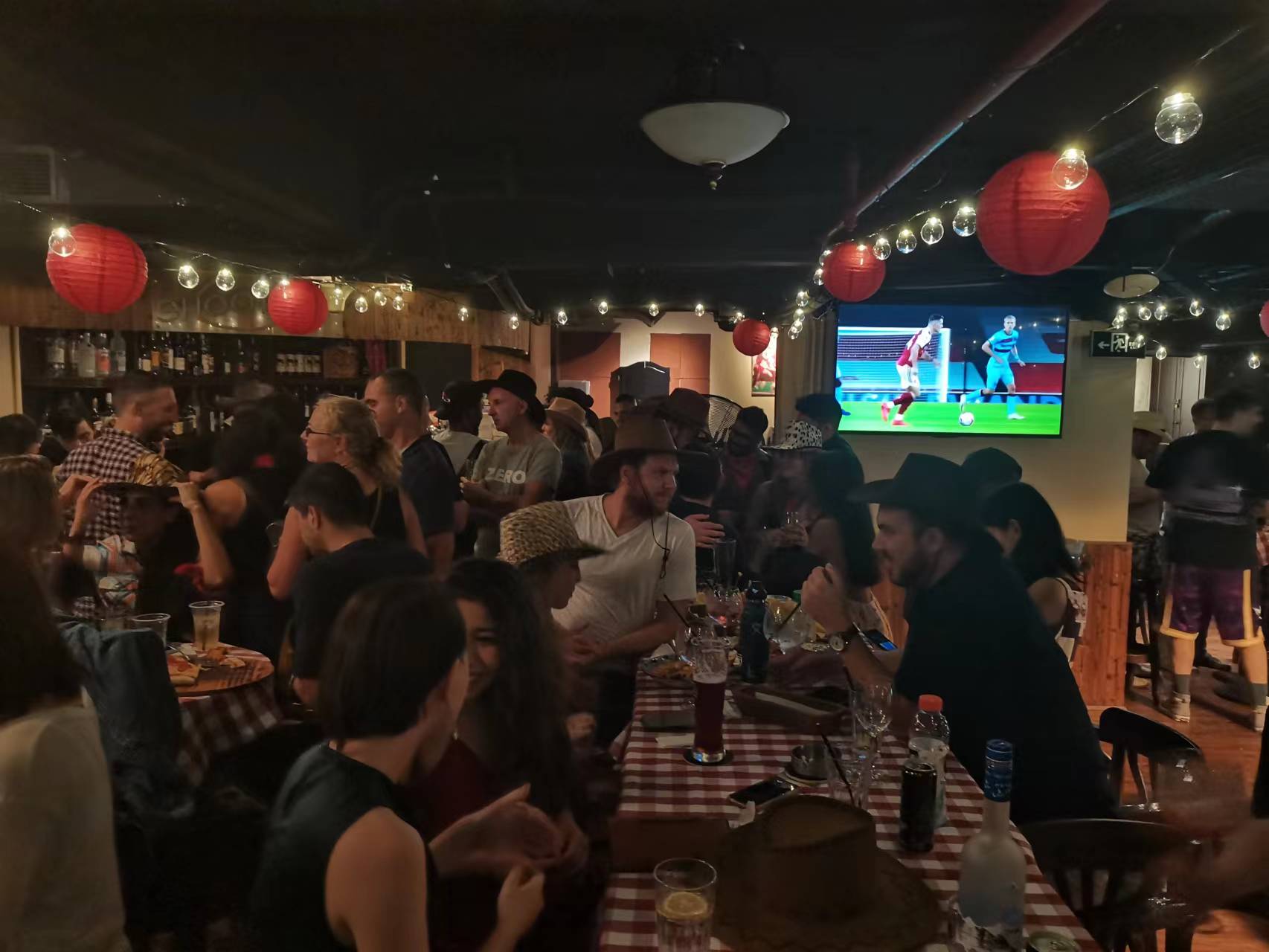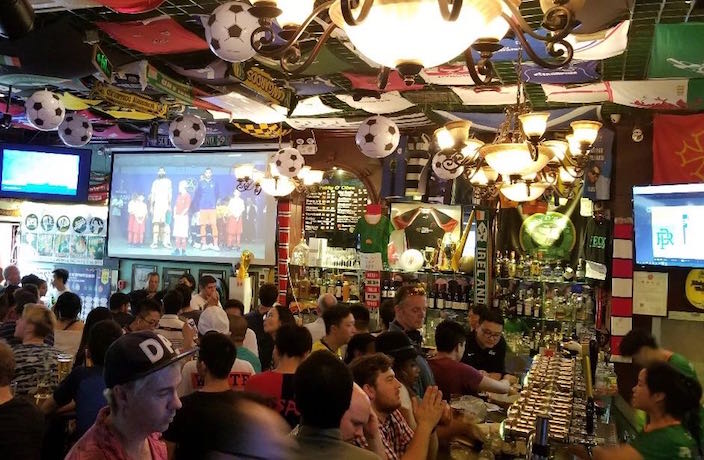It’s been 20 years since China’s men’s national football team participated in their first and, to date, only FIFA World Cup. The 2002 competition – hosted jointly by Japan and South Korea – saw the Middle Kingdom finish bottom of Group C without a single point.
Perhaps, the men’s team could take a leaf out of China’s women’s football team, which beat South Korea 3-2 to win the 2022 AFC Women’s Asian Cup.
While China’s men’s team hasn’t performed on the pitch, enthusiasm for watching the competition hasn’t been dampened.
According to FIFA, China contributed around 655.7 million views, including television viewers, out-of-home and digital-only viewers to the 2018 Russia World Cup’s total viewing numbers, around 18.4% of the global total. A number undoubtedly aided by the 5-hour time difference between some parts of Russia.
Although World Cup kick-off times can be awkward for viewers in China, footy lovers all over the Middle Kingdom are always sure to congregate and watch their favorite sport. Expats watching the game often find themselves in a unique position; they often face family feuds and watch games with friends who support their nation’s opponents.
This year's competition in Qatar will likely prove no different.
READ MORE: That's Guide to the FIFA World Cup Qatar 2022
With just days to go until the World Cup 2022 kicks off, we take a look back at World Cup memories from over the years, sharing stories from locals and expats alike.
The Long Haul
Awkward kick-off times are something that the owner of Morgan’s Public House – who asked that we don’t publish his name – discusses when he thinks of the World Cup in China.
He’s been in the Middle Kingdom since 2009 when he opened The Tavern sports bar (later renamed Morgan’s) in Guangzhou’s Central Business District, Zhujiang New Town.

A packed Morgan's for Euro 2020. Image via Morgan's
“The 2010 World Cup in South Africa was crazy. We were open for 24 hours and would close the kitchen at 4am,” he recalls. “We’d still have people here at 6am when the games finished. At that time, we’d send for 80-90 Egg McMuffins from McDonald’s.
“Everyone would stay and chat about the game until about 8am, and then people would just go off to work.”
Braving unsociable hours to watch national teams play in the World Cup shows the loyalty and unwavering commitment that football can generate.
However, such loyalty and commitment may need limits.
China Daily reports that at least three individuals died while watching the 2014 World Cup in Brazil, including a 39-year-old in Shanghai who stayed up for three consecutive nights and collapsed on his couch during the Uruguay-Costa Rica game.
One would hope that this year, spectators find the time to get some rest after a long night of footy viewing – balancing football fever with well-being.
World Cup Competitions Through China’s Eyes
From Harbin to Hainan, Shanghai to Xinjiang, it’s not difficult to find football fans among China’s population of 1.4 billion people.
One of those is the appropriately named Messi Zhang in Beijing. A native of Langfang city, Hebei province, Zhang has worked in the Chinese capital for several years.
He recalls when he first became interested in football at 10 years old:
“That was back in 1996. It was the third season of the Chinese Professional Football League and we harbored high expectations for football in the country at the time. People were enthusiastic about the professional league when it was still new.”
Zhang recalls how the World Cups of 1998 in France and 2006 in Germany were the ones that influenced him the most.
“There were really a lot of stars that appealed to Chinese people at that time, such as Ronaldo, Batistuta and David Beckham.
“I would normally stay up late to watch the World Cup with friends on TV during those years. Recently, I’ve kind of fallen out of love with football. Between spending time with my family and working, I don’t have that much time to watch it anymore.”
Zhang is not the only one to fall out of love with domestic football and the county’s men’s international team. The domestic leagues have dwindled and prolific failure in international tournaments has led to widespread disengagement.
The Expat View
When it comes to World Cup memories in the eyes of China's expats, there’s perhaps no better person to speak to than Argentinian Maximiliano Postigo. His passion for football becomes apparent as soon as he starts speaking to That’s.
The Buenos Aires native started coming to China around 20 years ago, and later settled permanently in Shanghai in 2004. His expertise in corporate finance has led him to work in many positions and start several business projects – the latest of which is WeWine, importing wines from abroad onto the Chinese mainland.

Image via Maximiliano Postigo
When he’s not working, Postigo plays as a goalkeeper for a team in Shanghai – a position he’s played in since childhood.
“Goalkeeping is a complex position. You can win or lose a game for your team in a matter of seconds.”

Postigo with his two children following a hard-fought match in Shanghai. Image via Maximiliano Postigo
Postigo recalls his first time watching the World Cup in China in 2006. He saw many of the games in Shanghai’s O’Malley’s Irish pub, where the beer garden would draw huge crowds.
A standout positive memory of the tournament? It had to be the goal scored by Maxi Rodriguez in the 98th minute of extra time to give Argentina a 2-1 win against Mexico in the Round of 16.
However, there were probably no World Cup games that could have prepared Postigo for the roller coaster ride of emotions he would experience during 2014.
“In 2014, I was the founder of The Apartment (an American fusion bar in Shanghai that has since closed),” he tells us. “At the time, we also had The Geisha and other venues. In The Geisha, we opened a place called The Flamingo which had more than 40 screens on which to watch the World Cup.”
In the semi-final, Argentina faced the Netherlands – a family affair for Postigo, given that his wife is Dutch.
In a hard-fought game, Argentina beat the Dutch side on penalties to go through to the final.
With Postigo’s son only seven months old at the time, he found himself watching the game at home while on parenting duties.
“As the game finished, I was holding my son in my left arm. Argentina had won and everyone else was celebrating, but our house was silent.

Postigo watching the 2014 World Cup with his son. Image via Maximiliano Postigo
“I didn’t say a word. My wife was crying. Dutch people are very passionate about football, too.
“I showed my son and told him, ‘Mum is very sad.’ My wife slept alone in my son’s room that night because she was too upset and we didn’t speak to each other.”
Fortunately for Postigo, football rivalry hasn’t gotten in the way of a strong marriage. The couple had their second child – a daughter – in 2015 and remain happily married to this day.

Posing for a Christmas photo with santa; Postigo with his wife Jacquelien and their two children. Image via Maximiliano Postigo
If anything, Postigo’s strong connection with Shanghai’s Dutch community shows how football can bring different nationalities together. He recalls watching the 2010 World Cup in O’Malley’s Irish Pub with a group of Dutch friends.
At the end of the day, it’s only a game, right?
Pints, Penalties and Passionate Patrons
An article about World Cup memories from China would not be complete without hearing from the venues which host so many patrons during the big games.
The owner of Morgan’s recalls how the 2010 World Cup – when The Tavern sports bar was barely one year old – put the venue on the map. While the atmosphere might be comparable to a pub in England – from whence the owner comes – running a pub in Guangzhou is a little different.

Patrons in Morgan's watching Euro 2020. Image via Morgan's
“The England games were particularly popular because we are kind of an English-style pub,” he explains. “But games between many other countries were also very popular. Colombia’s games always brought in a big crowd. Mexico and Brazil were the same.
“It’s not like running a pub back in England where you’re just waiting for the England fans to come in and watch games. We had a following for each game. That means that each game had a particular sense of excitement because we would have loads of fans who were from those countries.”
French expat, Mathieu is also familiar with running a busy venue. Having first arrived in Beijing in 2010, the Frenchman has been involved with Paddy O’Shea’s Irish Pub as a customer, shareholder and now owner.
“I arrived in Beijing in early 2010, just a few days before the start of the World Cup,” Mathieu recalls. “I discovered Paddy’s by searching online.
“The World Cup in South Africa started on June 11, and it was very hot. The place was packed, and once the first tones of Shakira’s song – ‘Waka Waka (This Time for Africa)' – were played, everyone just went crazy! I don’t remember that much about the game though.”
He admits he’s not a huge football fan, stating that he prefers a certain sport with an egg-shaped ball. However, when it comes to the World Cup, he concedes that it is “something else.”
“Paddy O’Shea’s is a place where World Cup passion comes to life. I remember in 2018, some customers had traveled to Russia to see live games; they reported back that they preferred the atmosphere at Paddy’s rather than in the stadium! Maybe they did exaggerate a little bit, but I am keen on believing that.”

Paddy O'Shea's during the 2018 World Cup. Image via Paddy O'Shea's
In 2019, the venue underwent renovations with a layout more conducive to watching the big games. Mathieu acknowledges that the 2022 World Cup in Qatar will be a little different; as the first ever World Cup to take place during winter, Paddy’s won’t have anything set up outside the pub (it’s a little chilly in Beijing at this time of year).
The most important reminder from Mathieu to those planning to watch World Cup games at Paddy’s? “Come early! Fashionably late won't work.”
Anyone who’s experienced a big game in the venue will understand what he’s talking about.
Not Long till Kick-off
As of press time, the Qatar 2022 World Cup is just a few days away.
2022 marks yet another World Cup year in which China will not be participating. However, that certainly won’t stop World Cup fever in the country amongst locals and expats alike.
The kick-off times aren’t as favorable to China-based viewers as they were four years ago – with some games starting at 3am (BJT). However, with some matches kicking off as early as 6pm, and the final starting at 11pm, viewing numbers will undoubtedly be high.
Statistics aside, watching the World Cup in China is a great chance to make memories and bring people from all walks of life together – the kind of memories and togetherness that are forged in venues like Morgan’s, Paddy O’Shea’s and among passionate football fans.
[Cover image via Paddy O'Shea's]





















0 User Comments